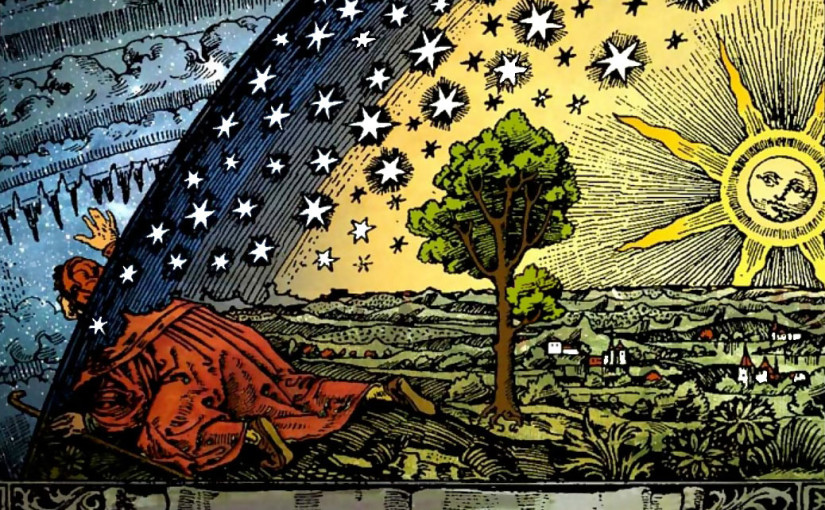Tag: jesus christ
The Radical Vision
Why should we do good? In being good, to understand there are others in this world, who are just as alive as you, and make that fact matter to you—why do that? Why should we care about others, or even believe that they are as real as you? Why shouldn’t we take care of number one, and only this self? Surprisingly, it may come down to one philosophical question: do you believe that there exists the concept of logic? And not necessarily such as called formal logic, but even when emotions drive their own logical process. Just to make sense. Do you believe somewhere that you are the most important thing in the world? Or another tack: do we do good for a reward? For surely the evil do evil for reward. What makes one so different from the other, then? We know that evil does it at the expense of others, while good does it for the sake of others. But why is it we should be selfless rather than selfish?
So there might be three modes of the soul: out for one’s own self no matter what, for one’s self as much as others, and out for others at the expense of oneself. The first, the logic involved is merely to ask, is it good for me? A yes or no to that one question might even determine their idea of right or wrong. The second involves a certain balance, and negotiation. The logic might be, does the world agree with my action? And the third, he thinks nothing of oneself, just that the good is done. It comes down to the answer of that one question: “Am I the most important thing in the world?” And perhaps it is telling that Lucifer’s great sin was that of pride. In that world, undoubtably Jesus Christ, Son of God, was the most important of all; Lucifer, against all logic, denied that. At the other end of the spectrum is the humility of a saint, not to think of oneself at all, for surely, there’s a great big world out there that’s better served. And then one reasons that the middle of the roaders (probably most of us), can accept the argument that we are not the end all be all of existence, but we’re don’t want to be ignored, either. And then to ask the three types, “1+1=2, correct?” will get an “of course” from types three and two, but the first—he may not acquiesce something even that simple, that obvious, if it isn’t in his best interest. And that is to admit no logic but his own, which is no logic at all.
We have the choice in which way to think and act. We have been empowered to think this, given the freedom and the confidence: if all we were able to do was scrape out a living, we would scarce have the luxury. It is no small thing. And so we distill it to pretty much the purest choice there can be. Order or chaos? Reality or delusion? Meaning or senselessness? Reason or insanity? This is what it means, that choice, to accept that there is something called “logic”, “reason”, “understanding”, and that it makes sense. Of the world, of reason itself, even. To choose otherwise is like killing logic and feeding off its carcass. That would be to say that such things exist to serve you, and have no external reality. And did you think it, in which I imply that to be the most logical is to be the greatest of the saints? I leave why that might be as an exercise for the reader. But what if what Jesus Christ died for, the salvation of everyone who could be saved: what if the question of “are you saved?” doesn’t rely on what you “believe”, except for this state of your soul: that the question literally becomes, “can you be reasoned with?”
If what you now know is to think that you are fully aware of the world, or aware enough, it is a fully conscious thing you do: choose. How solid is your logic, what you know are the rules you should live by? Are they absolute, or do they wrap to fit any desire? Then, back to the original question: why be good? Of course, ultimately, I cannot answer that for you. Free will is not an illusion, and the choice must be real, and a personal one. As one of the good guys, though (I try to be, at least), let me just say that there is a truth and it’s on our side. It is the nature of logic, n’est-ce pas? And as one of the good guys, I must give you the main reason to choose the right over the wrong. Simply put, we’re where the love is. Really, if you decide anything is higher than sheer, unbounded love, we can sorta do without you. Like if you think yourself so darn important. If your heart is filled only with thoughts of yourself, it has no room for love to dwell within it. And as for reward, the good guys have the love that is true and unfiltered. In the most extreme, not even needing that we receive it from others…
We can do one better than our reasoning ending in love. Let’s start our understanding of all the world with these three words: God is love. And there is no higher. I like to say, even if you don’t believe in God, you can believe that God is love. There is no better concept that you can have God being, and there is no subordinate thing that you would have love be bound to, for true love is beholden to nothing. God is light, God is mercy, God is justice: it’s all covered by those three words. And it matters not that the world is sometimes a rotten place to live in, just that you believe that there is something better that we can strive toward. Do you believe that it is just not worth it? God is there for you, if you truly have nothing. Consider that. And then there is the Son of God: Jesus Christ is known as the Logos, which is often translated as the “Word”, but might be more correctly be understood as “Holy Reason”—logic. It all does fit together.
Why do good? It is the only way you will understand love. Those that refuse all logic, it is not that God won’t forgive them, but that they sabotage the mechanism by which they may be forgiven. Basically, they kill themselves rather than admit that God is love. They cannot be reasoned with. And if you think this is a funny way to determine a soul’s salvation, we recall that that we are not necessarily saved according to our works. And salvation is not necessarily to believe in Jesus Christ, for he says, “Why call ye me, Lord, Lord, and do not the things I say?” [Luke 6:46] What does he say to do, above all else? Love. It is the way and the reward: to be able to negotiate something away from yourself, and give it to another.
Christianity always had fantastic elements to it. But of the miracles Jesus Christ was supposed to have performed, it is only necessary to believe in one of them, the “sign of Jonah”: the Resurrection. According to Paul, without that, our faith is in vain, so for now, let’s just say that it is true, and Jesus Christ came back from the dead. And maybe also that his cosmic significance might be stated that he was the Logos—the logic of within and without. Preaching was to spread that logic. We forget, these centuries on, how it was such a radical vision. Way back, there was a certain way to be, a certain way to act, to believe. Then he came, and said to love your enemies. And that he who is without sin cast the first stone. This was the manifestation of the God who is love. Prophets before him said to give justice to the poor, and decried those who were in power. To worship God by one’s actions, and not by lip service. But this is the myth we came to know: when Jesus Christ came back from death, he came back as every one of us. He saved all the world.
You see, logic is a certain type of faith. Einstein at one point wished he had never called his theory “Relativity”, because everyone kept saying how it made everything relative. This was the opposite of its intent, that the laws of physics were the same relative to everyone and every place. We believe that if something is true, then it is true everywhere that the context of the truth is valid. If this were not the case, that would be pandemonium. Literally (or close to literally). And it turns out, the power to negotiate the truth is all that the Savior needs to save us, save any of us. Because if you can be reasoned with, you can be a part of the Logos. You see? This is the Resurrection. What about all those Christians telling us that we need to believe in Jesus to be saved? Our idea of Christ is of that Logos, which is the logic of love, as above. In this way does it follow that anyone, anywhere, anytime, can be saved by that Jesus, who is everywhere, being the Logos—the means by which anything exists—who in the beginning was with God, and who is God. Why did he tell all his followers to spread the message to all the world? Because it is true that in hearing the message and accepting it, they might be a cell wherein Holy Reason dwells, just like that. He saves us in any wise, believer in the Resurrection or not, but by the Message may we in life walk by that great light, the light of Jesus Christ. And that is not a negligible quotient.
Why be good? We might find it is an awesome thing. We often find ourselves facing an evil world. And to be able to do good in such a world, a thousand no’s to your one yes: surely there is reward, even in the attempt. For we are made of the choices we make. This you know. But when we see that God is love, believer or un, we understand that the ideal for which we reach… we bring the dream into existence. When we love it is how heaven touches down in the waking world. And mingles. Forget all the visions and proclamations, forget all the miracles, forget all religion entirely. Love is real, whether you believe in it or not. It is how we share the dream. How close heaven has always been to where we are.
If you like what’s written here, check out my book, Memoirs from the War in Heaven.
Judas, Out of the Blue
When Jesus Christ was in the custody of the Sanhedrin, Judas Iscariot showed up, sort of at the side door, out of the blue. He said to them, “I sinned; I handed over to you an innocent man.” [Matthew 27:4 NCV] And he threw the 30 pieces of silver they had paid him back at them. Innocent? Had he thought during the handing over that Jesus was guilty? One might believe he always believed the Lord to have been innocent. One imagines that when he was making the deal, that it was not foremost on his mind that they were going to have him killed. Did he actually think he were doing the right thing, those hours ago? I will contend that of all the mysterious motives for him to perform the act, there is one more likely than the rest: he had been told to do it, by Jesus himself. After Jesus was in their clutches, Judas lost his nerve and goes back to them, they so keen on snatching up our Lord. He had found out somewhat later that they meant to kill him, and so the rescue attempt, however ineffective.
As is the common thought, did he have a change of heart from the time he handed Jesus over to recognize what he had done was wrong? Which would mean he hadn’t thought it was wrong before, and he did now. There must have been a good reason in Judas’ head why he handed the Lord over, at least, at the time. Had he at that point with the kiss not been convinced Jesus was the Christ? It seems unlikely that anyone who had been there for all the miracles—who was one of the ones who had been sent out by the Lord to perform miracles in his name—unlikely that he would not think Jesus was somehow sent by God, in some degree divine or holy.
If this were so, if Judas realized Jesus were holy, then either handing him over was the right thing to do or Judas suddenly and inexplicably became evil. Or perhaps it had been building the whole time? Or was he evil from the first? (That one unlikely by most imaginations, unless the entire discipleship, leading to the “handover” and throwing the money back at them was the way, ultimately, to redeem an originally evil person.) Or perhaps he became jealous of Jesus’ authority, and he was fixing that problem with a prejudice. …except then, some hours after, he repented…
One is used to thinking of Judas as evil. We rail against changing a story that is that well known, that you know by heart. It is practically ingrained in you. You will reflexively fight to defend what you know to be true: gospel truth, right? But often in studying the myth, the ugly head of reality peeks through, to see things we might not have thought of at the outset.
There have been theories as to how this myth (the myth of Judas the Betrayer) formed, like how Mary Magdalene were made into a repentant whore. Which now is pretty certain that was not the case. So, this “Mary Magdalene effect”—what if it happened as the gospels were being gathered, and written down? And the myth of the betrayal of Judas made it into the canon, with some other questionable parts, and now we accept it as being part and parcel of the Truth?
People don’t even think about it any other way but the way we were taught in Sunday school, the accepted story being so prevalent. But what if, instead of him out of nowhere turning evil, Jesus Christ himself told Judas to hand him over, for it was his time? It makes SO MUCH MORE SENSE. Jesus Christ had not chosen a bad egg, who was completely blind to his divinity. Judas volunteered to hand him over, when the opportunity arose. Why did it end up being told the way it was told, how we’ve come to know it? If you know any Bible scholarship, there’s a lot in that grand text that became as it was by various competing forces. Much of Isaiah, for instance, is thought not to have been written by Isaiah. And Biblical infallibility? That it is useful in any matter of faith? Judas being innocent may be the greatest of the whole Bible in which when you see it as being wrong, it makes no difference in how we are to worship God. There are other parts, too, that we now believe are just incorrect. And it perhaps diminishes the Bible in thinking we cannot inject reason into it and have it survive the medicine. Faith should be stronger.
In reading the Scriptures, it strikes one as to how—sometimes—it is, if not inaccurate, imprecise. Like the Babylonian exile. Even if the exile being not exactly 70 years is not brought to scrutiny, there is stuff in there about Babylon being overtaken in kind of a cataclysm, which presumably would have immediately preceded the Jews being released. But Babylon, for a historical fact, did not fall violently. Isaiah 13:19 says, “Babylon, the jewel of kingdoms, the glory of the Babylonians’ pride, will be overthrown by God like Sodom and Gomorrah.” But that didn’t happen. It is true the Jews were released, but nothing like how prophecy laid it down.
To which the enlightened Christian will say, “the Bible is not history.” Yea, verily. I will state a commonly held scholarly belief: the writers of the Gospel had a certain agenda, each of them, in writing them. Their motives were not to provide the most accurate account of what had happened decades before they first put pen to paper. And they most likely did not accurately attribute those writings, either (John didn’t write John). So what do we believe? One can yet find the message in the Gospels, even if they are not all fact, in fact. And that’s likely what the Gospels were meant to impart: the Message. Of a man who was God but did not lord it over everyone, even if that’s what they called him. Who came to serve instead of being served, who did not conquer but took the worst that the world had to give and still was able to love it all. And us all. Who asked God to forgive those who were murdering him, for they knew not what they did. How is it served by blaming one of his closest associates for a baffling betrayal? Is that account of betrayal perhaps the tip of an iceberg?
I get this starting from Klassen. This is what scholarship tells us: Judas = Judah = Jude = where the term “Jew” comes from. It was a time when Christianity was turning from a Jewish base to a primarily gentile following. In moving away from the jurisdiction of “the Jews” as the later Gospels call them, the followers become anti-Jewish, pro-Roman, to the point where in their “good news”, “the Jews” cry out about their King… really? to crucify him, and further, “His blood be on us and our children!” And Pontius Pilate—who was removed from office at a later point for being excessively vicious—he was actually the good guy! Washing his hands of the whole affair (a Jewish gesture). One cannot look at this critically and not see something very wrong with this picture.
So, it was who that crucified the Lord? The Jews? Even if, as a rule, the Jews did not crucify anyone. The Jews, represented in singular form by Judas, the convenient prototype, who is in fact named so prototypically. That we don’t now associate Judas with Jews in general anymore does tell us that the point of time is past the limit of relevance, and it may be now to reevaluate what exactly we believe and why. Because we understand that many constructs within the Bible are now antiquated, and some things have to be most severely interpreted, warped from their original positions, to make sense currently. We do not stone to death someone who has blasphemed anymore. And as for the New Testament, am I taking crazy pills, or does the text not at least imply the thought that Jesus Christ was coming back real soon in relation to those first-century disciples? We interpret that away, don’t we? These are those warpings. We have grown used to them.
Judas has become a device. Once again, we look to Mary Magdalene. How convenient that we have a fallen woman that the Lord had turned from her wicked ways. But as we come into the future, we may find that the figure of Mary Magdalene may be rehabilitated, if the actual person never needed such saving as was thought. Judas is another matter. His position among the damned we learn from the mouth of the Lord himself, as (part of the) “gospel”. Why should we believe differently, could that truly have been so wrong? Well, if you found out that the past did not happen as the Bible said, do you still believe that part of the Bible? I mean, factually. If your answer is yes, I can only shake the dust from my sandals and bid you good day.
“I sinned; I handed over to you an innocent man,” he said. Why do we so desperately want a villain? The most foul one imaginable, one in the inner circle who turned evil, like the Lucifer myth. But then, let’s say that Jesus had told Judas to turn him over, why does he try and rescue his master? Perhaps like the other disciples scattering at Gethsemane the night before, without the Lord, he lost his nerve. He wanted his teacher back. If he were, in fact, guilty, why would he not have run away? Instead, he shows up, out of the blue, and said as if confessing, “I sinned.” I have done something wrong, I know it. This couldn’t be what he actually wanted. “I handed over to you an innocent man.” I am telling you, me, the one who gave him to you, this cannot be the plan: you do not put an innocent to death!
The Lord had said he was going to be turned over, but his disciples did not understand. Peter took him aside and told him not to speak of such things. The Lord said he was going to be handed over to be crucified, but that thought had not hit, just yet, when Judas identified him with a kiss in the darkness. Without the Lord, when Jesus Christ let himself be taken, the disciples were at a loss as to what to do. They fled. Peter would follow the ones that had taken him, but ended up denying him three times in his course.
Surely all this could not have been what was supposed to happen? The reality of it was so different from the words that had described it. They had been in his presence when he spoke of these things, and without him was gone all courage, all reason, all sense.
“I sinned; I handed over to you an innocent man.” He repented, as if he had needed to. This was courage, do you not see? But it is written: he was a villain. You can say what you want, but what a billion say is truth, the whole truth, and nothing but the truth—how can you argue with what is there in plain black and white? The simple fact? You can’t. But you can know better. Just like you can see that the story of Adam and Eve didn’t actually happen like that, you can see that Judas is blameless. Because it makes no sense, the conventional story. He was Judas, Judah, Jude: a symbol for “the Jews”, who killed our Lord and Savior. The death story of our Lord has suspect things throughout it. Will you not accept the spirit of the story instead of holding on to the letter? Perhaps now, we can be trusted with that canniness, to go in the direction the Bible is pointing toward, in spite of all that’s wrong with it. If you don’t think there is anything wrong with it, read it. We as a people did not remain unchanging in how our heart reacted and reacts. We found, and continually find, what is the good and what is the better that we can make of this world. Open your eyes/have eyes to see. Forgive everyone. Yes! Forgive everyone! For if we do that, it doesn’t even matter who is innocent or guilty, right? Right? And it’s not ours to judge, anyway. Right?
If you like what’s written here, check out my book, Memoirs from the War in Heaven.
The Prophet’s Brief (A Theory of Everything)
I, being a prophet of the Lord Jesus Christ, in the line of Philip K. Dick, present to you what I have pieced together as a theory of everything. In what it solves, it does in broad swaths, but how a God can be all good while there is pain and unjust suffering—I believe I have an answer. See if it makes sense to you, and better yet, more sense of the world around you. It is one of the central documents of the War in Heaven. Take it as you will.
- In the very beginning, before the universe, there was Eternity. No evil existed, there God and His angels lived in the light, with other heavenly beings.
- Lucifer said “no” to the Holy Spirit, that being the unforgivable blasphemy, from his pride becoming Evil. (God is love, and to say “no” to love is for that part to die.)
- The “no” was the birth of Sin/Pain/Error (Daughter of Satan). Before, there had been none of these. No one had ever committed an error. No one had ever done wrong. And how great a wrong it was.
- The entity known as Sin was to have been born into excruciating pain, through her very essence, so she was killed out of mercy before she was born (given the light of life). However, she still had a semblance of form (antiform), and this form had enough spirit (antispirit) in its essence to move the form as if it had life. Antiform and antispirit were the power rendered to darkness by Evil.
- Lucifer (Evil) copulated with Sin and Death came to be (Son of Satan).
- Satan convinced 1/3 of the angels to commit sin and become evil. In committing Evil, (and bringing about Sin and Death), Satan and his angels ruined a part of Heaven, and this part was to become Hell when torn away from the main. For Heaven was so good that it could even accommodate such evil and its works.
- The body of Sin was cast into the outer darkness. This was the primordial chaos (formlessness of Genesis 1). Also known as Rahab.
- The one about whom it is said, “She is dead and giving birth to monsters.”
- Here was the environment wherein would form the material world, and this world—to use her body as the basis for its first stuff—this world is in part was a tribute to the one that was lost. For she was never given a chance.
- That it was so difficult to work with, being formless, being of essence “error” itself, and from that it was made beautiful by God, in fitting ways, explains much of the character of this universe, that even the worst situations can bring forth wonder.
- Satan sought to kill and replace the Logos, who was God (see John 1). This was the beginning of the War in Heaven. Michael and his angels were dispatched to fight the Dragon (Satan) and his angels. For Satan desired power ultimate, unholy.
- The War in Heaven was combat between Logos and derangement, truth vs. lie, and to be on one side or the other was good vs. evil.
- The battleground were the Godhead itself, the root controls of existence. So that all creation groaned under the War.
- Every one of Michael’s angels (and of course Michael) won, so that derangement—none of it—it did not ultimately win anywhere. There was no crack in the edifice of creation, the pillars of its existence (there are four).
- But that there was even a fight at all meant that the created world would have such things as natural disasters in it—just that laws of physics would not break—and there would be opportunity for the evil we now witness, to this day. That which was permissible in the matrix.
- They did kill God, this being called the Cross, but that concluded not with that death, but with His defeat of Death itself: the Resurrection. Being the Son of God means that he is God (this was the “blasphemy” that he had been charged with by the Sanhedrin).
- That Jesus Christ had to die for the world to be saved tells you how FUBAR things got, how powerful the forces of evil had become, that the will of God would be so forced. To hold to logic is sometimes finesse, often brute. At times one invoking the other. But there was no getting around it in this fight.
- Having been sinless his whole life, in his death was the defeat of Sin.
- This is how the God who is love defeats Evil: Jesus gave himself and was obedient to God with the whole of his own life, even to the death. The whole of his trust. To defeat Death not with any weapon but the nature of what love truly is. The light by which life moves, and is moved.
If you like what’s written here, check out my book, Memoirs from the War in Heaven.





